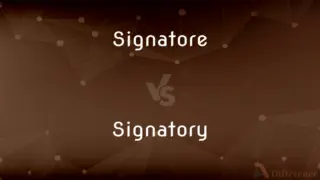Divet vs. Divot — Which is Correct Spelling?
By Tayyaba Rehman — Updated on July 18, 2024
"Divet" is the incorrect spelling of "divot," a piece of turf gouged out with a golf club or other tool.

Table of Contents
Which is correct: Divet or Divot
How to spell Divot?

Divet
Incorrect Spelling

Divot
Correct Spelling
ADVERTISEMENT
Key Differences
Remember, "divot" contains the same vowels as "golf," the sport most associated with the term.
The word "divot" originates from Scottish dialect, where the letter 'o' is commonly used in similar contexts.
Visualize the letter 'o' in "divot" as the hole left behind in the ground.
The correct spelling is "divot," which rhymes with "pivot."
The word "divot" has five letters, ending with "ot."
ADVERTISEMENT
How Do You Spell Divot Correctly?
Incorrect: Please replace the divet after hitting your shot.
Correct: Please replace the divot after hitting your shot.
Incorrect: Look at the size of that divet from your golf swing!
Correct: Look at the size of that divot from your golf swing!
Incorrect: We need to fill these divets to keep the lawn smooth.
Correct: We need to fill these divots to keep the lawn smooth.
Incorrect: He accidentally created a huge divet on the first tee.
Correct: He accidentally created a huge divot on the first tee.
Incorrect: Can you see where the divet landed?
Correct: Can you see where the divot landed?
Divot Definitions
A piece of turf torn up by a golf club in striking a ball, or by a horse's hoof.
A piece of turf cut out of the ground by a golf club in making a stroke.
As he swung his club, it cut a neat divot out of the pristine golf course.
In Scotland, a piece of peat that is cut from the earth and used for fuel.
As the winter approached, they gathered divots for their fires.
A small indentation or hole in the ground made by an object's impact.
The golfer replaced the divot after taking his shot.
In landscaping, a chunk of grass and earth removed during maintenance.
He spent the afternoon fixing the divots in the soccer field.
A piece of turf cut out of the ground by a golf club or spade.
After his swing, a large divot was missing from the fairway.
(Scots) A thin square of turf or sod used for roofing.
A torn-up piece of turf, especially by a golf club in making a stroke or by a horse's hoof.
A disruption in an otherwise smooth contour.
The space between two pillows.
(golf) The cavity left when a piece of turf is cut from the ground by the club head in making a stroke.
It was a good drive but the ball ended up in a divot.
A hole in the ground left by a divot or caused by impact.
He tripped over a small divot on the otherwise smooth trail.
A tool used to repair the grass on a golf course.
The groundskeeper pulled out his divot to repair the turf where the golfer had swung.
A clod or lump of dirt.
The child picked up a divot and threw it into the pond.
In golf, the slice of turf displaced during a stroke.
She always made sure to repair any divots she caused on the course.
A drop in a graph between two linear portions.
To tear up pieces of turf from, especially with a golf club in making a stroke.
A thin, oblong turf used for covering cottages, and also for fuel.
A small piece of turf gouged out of the ground by the head of a golf club when making a stroke.
A piece of turf dug out of a lawn or fairway (by an animals hooves or a golf club)
In golf, a small piece of synthetic material used to replace a chunk of turf taken out by a golf club.
After he made his stroke, he used a rubber divot to fix the spot.
A small indentation or dent in any surface.
He ran his fingers over the divot in the wooden table.
Any small depression or hollow, especially in a surface.
After the storm, the field was scattered with water-filled divots.
Divot Meaning in a Sentence
The mower left a divot in the middle of the lawn.
He was proud of the smooth repair he made on the divot.
I tripped over a divot on the soccer field.
She took a practice swing, careful not to make a divot.
Mark filled the divot with some soil and grass seed.
They showed the beginner how to replace a divot properly.
After the match, they worked together to repair the divots.
A divot repair session is scheduled for volunteers.
She explained the importance of divot repair to the new members.
The groundskeeper was meticulous about divot maintenance.
The divot had grass still attached, making it easy to replace.
Each golfer carried a tool to fix divots.
The divot from her golf club was almost perfectly circular.
During the tournament, spectators noted the players' etiquette with divots.
He joked that he made more divots than successful shots.
The rulebook included a section on the proper handling of divots.
You can borrow a divot tool from the clubhouse.
The coach paused to point out a poorly repaired divot.
She keeps a divot repair kit in her golf bag.
The children enjoyed picking up divots and throwing them like frisbees.
The heavy rain had washed away several divots, exposing roots.
His first attempt at golf resulted in more divots than he expected.
A bird had made its nest in an old divot.
The golfer was fined for not fixing his divots.
At the end of the day, they collected divots to analyze the soil health.
Divot Idioms & Phrases
Divot dilemma
A problematic situation involving minor but noticeable damage.
The wedding venue faced a divot dilemma after the previous event.
As deep as a divot
Very deep or serious, often humorously.
His love for golf was as deep as a divot.
Make a divot
To cause a small area of damage or disruption, especially in a smooth surface.
He made a divot in the lawn with his new golf clubs.
Fill a divot
To repair a small area of damage, especially in a lawn or fairway.
After the game, everyone helped to fill a divot.
Digging divots
Exerting a lot of effort, often without much progress.
They were digging divots trying to convince the board.
Common Curiosities
What is the definition of "divot"?
A divot refers to a piece of turf or a section of grass that has been cut out, torn up, or removed, especially in sports like golf when the clubhead takes a chunk of turf as the ball is struck.
Is there any difference between "divet" and "divot"?
The main difference is that "divet" is often considered a misspelling or mispronunciation of the word "divot," which is the standard and correct term in the English language.
In which context is "divot" most commonly used?
"Divot" is most commonly used in the context of golf to describe the chunk of grass or turf that is sometimes removed when a golfer swings their club and strikes the ground.
How do you pronounce "divot"?
"Divot" is pronounced as "DIV-uht," with the emphasis on the first syllable.
Is "divet" a word in the English language?
While "divet" is sometimes mistakenly used, the correct spelling for the word referring to a chunk of turf or soil removed from the ground, especially on a golf course, is "divot."
In which other sports, apart from golf, might you hear the term "divot"?
Apart from golf, the term "divot" can be occasionally used in sports like soccer or rugby to describe patches of turf that get torn up during play.
How do we divide divot into syllables?
Di-vot.
Can "divot" refer to anything other than a piece of turf?
Yes, while "divot" primarily refers to a piece of turf, it can metaphorically refer to any dent, depression, or gouge in a surface, especially one made by impact.
How should one avoid the confusion between "divet" and "divot"?
Remembering that "divot" is the correct spelling and is similar to other English words like "pivot" can be helpful. There is no "e" in either word.
How does one repair a divot on a golf course?
To repair a divot on a golf course, one typically replaces the chunk of turf or grass that was removed, ensuring it fits snugly, and then firmly presses it down. If the actual turf is lost or destroyed, golfers often use a mixture of seeds and soil provided by the course to fill in the divot.
Is "divot" derived from another word?
Yes, "divot" originates from Old Norse "dǫgg," which means a "sod" or "turf." The transformation of the term over time led to the English word "divot."
How is divot used in a sentence?
He carefully replaced the divot he had made with his golf club.
What is the verb form of divot?
Divot does not have a verb form; it is a noun.
What is the pronunciation of divot?
Divot is pronounced as /ˈdɪvət/.
What is the plural form of divot?
The plural form is "divots."
Is divot an adverb?
No, divot is not an adverb.
Is divot an abstract noun?
No, divot is a concrete noun.
What is the root word of divot?
The root word of "divot" is from the Scots "divot," which referred to a piece of turf.
What is the opposite of divot?
There is no direct opposite for "divot"; contextually, it could be a "mound" or "bump."
Is divot a noun or adjective?
Divot is a noun.
How many syllables are in divot?
There are two syllables in "divot."
What is the singular form of divot?
The singular form is "divot."
Why is it called divot?
It is called a divot because it refers to a piece of turf dug out, from Scottish origins where "divot" meant a piece of turf underlaid with earth.
What part of speech is divot?
Divot is a noun.
What is another term for divot?
Another term for divot is "turf."
Is divot a countable noun?
Yes, divot is a countable noun.
Is the divot term a metaphor?
The term "divot" itself is not a metaphor.
Is the word divot is imperative?
No, "divot" cannot be imperative as it is a noun.
Is the word divot Gerund?
No, "divot" is not a gerund; it is a noun.
Is the word “divot” a Direct object or an Indirect object?
"Divot" can be a direct object in a sentence.
Which determiner is used with divot?
Determiners such as "a," "the," and "my" can be used with "divot."
Which conjunction is used with divot?
Conjunctions are not typically specific to nouns like "divot"; they depend more on sentence structure.
What is a stressed syllable in divot?
The stressed syllable in "divot" is "di."
Is divot a negative or positive word?
Divot is a neutral word; it is neither inherently negative nor positive.
Is divot a vowel or consonant?
The term "divot" starts with a consonant.
Is divot a collective noun?
No, divot is not a collective noun.
Which vowel is used before divot?
The vowel "a" is used before "divot" when it is singular and indefinite.
Which preposition is used with divot?
Common prepositions used with "divot" include "in," "with," and "by."
Which article is used with divot?
The articles "a" (indefinite, singular) and "the" (definite) are used with "divot."
Share Your Discovery

Previous Comparison
Signatore vs. Signatory
Next Comparison
Cooli vs. CoolieAuthor Spotlight
Written by
Tayyaba RehmanTayyaba Rehman is a distinguished writer, currently serving as a primary contributor to askdifference.com. As a researcher in semantics and etymology, Tayyaba's passion for the complexity of languages and their distinctions has found a perfect home on the platform. Tayyaba delves into the intricacies of language, distinguishing between commonly confused words and phrases, thereby providing clarity for readers worldwide.














































